Ward A.W. The Cambridge History of British Foreign Policy. 1783-1919. Volume 3
Подождите немного. Документ загружается.

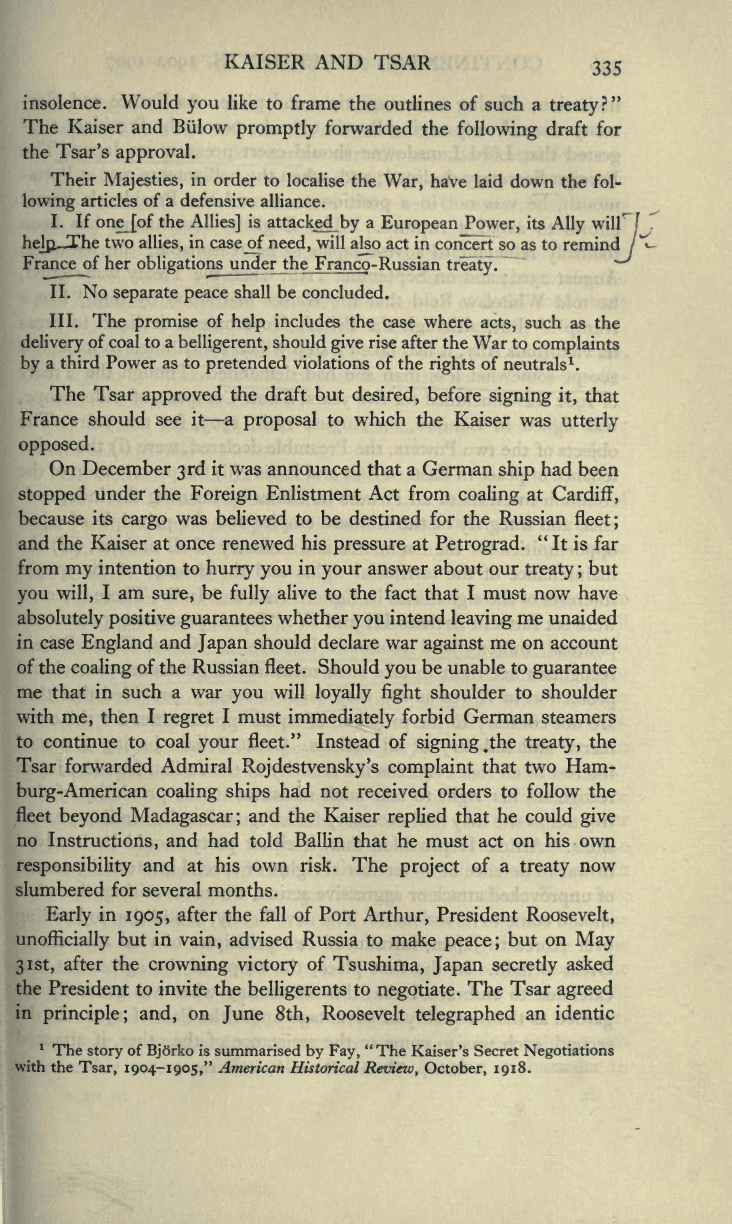
KAISER
AND
TSAR
335
insolence.
Would
you
like
to
frame the
outlines
of
such a
treaty?"
The
Kaiser and
Bulow
promptly
forwarded
the
following
draft for
the
Tsar's
approval.
Their
Majesties,
in
order to
localise
the
War,
have laid
down
the
fol-
lowing
articles of a
defensive
alliance.
I.
If
one_[of
the
Allies]
is
attacked
by
a
European
Power,
its
Ally
wilf
I
helpjrhe
two
allies,
in
case^f
need,
will
a]so
act in
concert so
as to
remind
j
France
of
her
obligationsjander
the
Franco-
Russian
treaty.
II. No
separate peace
shall
be
concluded.
III. The
promise
of
help
includes
the
case
where
acts,
such
as
the
delivery
of coal to a
belligerent,
should
give
rise
after
the War to
complaints
by
a third Power as to
pretended
violations of
the
rights
of
neutrals
1
.
The Tsar
approved
the draft
but
desired,
before
signing
it,
that
France should
see
it
—
a
proposal
to
which
the Kaiser
was
utterly
opposed.
On
December
3rd
it
was
announced
that a German
ship
had
been
stopped
under
the
Foreign
Enlistment
Act
from
coaling
at
Cardiff,
because
its
cargo
was believed
to
be
destined
for
the Russian
fleet;
and
the
Kaiser
at
once
renewed
his
pressure
at
Petrograd.
"
It is far
from
my
intention
to
hurry you
in
your
answer
about
our
treaty
;
but
you
will,
I
am
sure,
be
fully
alive
to
the
fact that
I
must
now
have
absolutely
positive
guarantees
whether
you
intend
leaving
me unaided
in case
England
and
Japan
should declare
war
against
me
on
account
of
the
coaling
of
the
Russian
fleet.
Should
you
be unable
to
guarantee
me
that
in such
a war
you
will
loyally fight
shoulder
to
shoulder
with
me,
then
I
regret
I
must
immediately
forbid German
steamers
to
continue to
coal
your
fleet."
Instead
of
signing
.the
treaty,
the
Tsar forwarded
Admiral
Rojdestvensky's
complaint
that two
Ham-
burg-American coaling ships
had
not received orders
to
follow
the
fleet
beyond Madagascar;
and
the Kaiser
replied
that
he could
give
no
Instructions,
and had
told
Ballin
that he must act
on
his own
responsibility
and
at
his own
risk. The
project
of a
treaty
now
slumbered for
several
months.
Early
in
1905,
after the
fall
of
Port
Arthur,
President
Roosevelt,
unofficially
but
in
vain,
advised Russia
to make
peace;
but
on
May
31st,
after the
crowning victory
of
Tsushima,
Japan
secretly
asked
the
President
to invite the
belligerents
to
negotiate.
The
Tsar
agreed
in
principle;
and,
on
June
8th,
Roosevelt
telegraphed
an identic
1
The
story
of
Bjorko
is
summarised
by Fay,
"The
Kaiser's
Secret
Negotiations
with
the
Tsar,
1904-1905,"
American Historical
Review,
October,
1918.
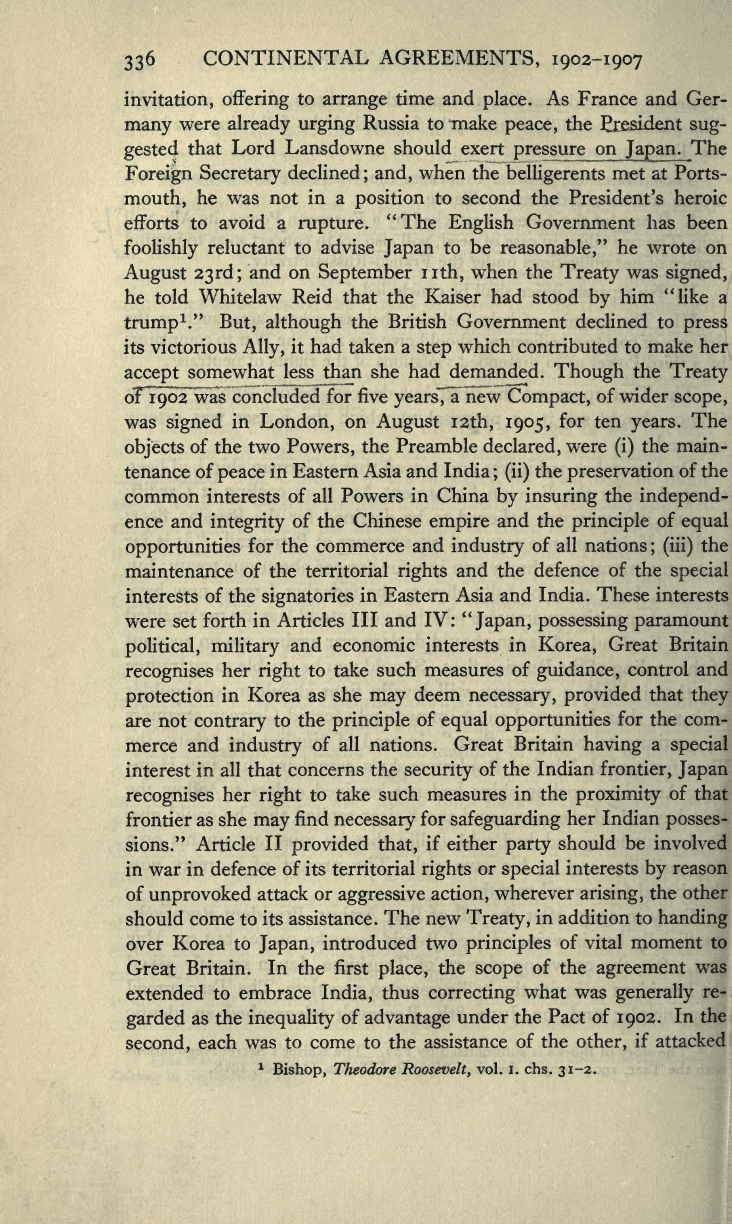
336
CONTINENTAL
AGREEMENTS,
1902-1907
invitation,
offering
to
arrange
time and
place.
As
France and Ger-
many
were
already urging
Russia
to
make
peace,
the
President
sug-
gested
that
Lord
Lansdowne should
exert
pressure
on
Japan.
The
Foreign
Secretary
declined; and,
when
the
belligerents
met at Ports-
mouth,
he was
not
in a
position
to second the
President's
heroic
efforts to
avoid a
rupture.
''The
English
Government
has been
foolishly
reluctant
to
advise
Japan
to
be
reasonable,"
he
wrote
on
August 23rd;
and on
September
nth,
when
the
Treaty
was
signed,
he
told
Whitelaw
Reid
that the
Kaiser had
stood
by
him "like a
trump
1
."
But,
although
the British Government
declined
to
press
its
victorious
Ally,
it
had
taken
a
step
which
contributed to
make her
accept
somewhat
less
than
she
had
demanded.
Though
the
Treaty
oT
1902
was concluded
for five
yearsTa
new
Compact,
of wider
scope,
was
signed
in
London,
on
August
12th,
1905,
for
ten
years.
The
objects
of
the two
Powers,
the
Preamble
declared,
were
(i)
the
main-
tenance
of
peace
in
Eastern
Asia and India
;
(ii)
the
preservation
of
the
common interests
of all Powers
in China
by
insuring
the
independ-
ence
and
integrity
of
the
Chinese
empire
and the
principle
of
equal
opportunities
for
the
commerce
and
industry
of
all nations
;
(iii)
the
maintenance
of
the territorial
rights
and the
defence
of
the
special
interests
of
the
signatories
in
Eastern
Asia
and India. These
interests
were
set
forth
in Articles
III and IV:
"Japan, possessing
paramount
political,
military
and economic interests
in
Korea,
Great Britain
recognises
her
right
to take
such
measures of
guidance,
control
and
protection
in
Korea as she
may
deem
necessary,
provided
that
they
are not
contrary
to
the
principle
of
equal
opportunities
for
the
com-
merce and
industry
of all nations. Great Britain
having
a
special
interest
in all
that
concerns the
security
of
the
Indian
frontier,
Japan
recognises
her
right
to take
such measures
in
the
proximity
of
that
frontier
as she
may
find
necessary
for
safeguarding
her Indian
posses-
sions." Article
II
provided
that,
if
either
party
should
be involved
in war
in
defence
of
its territorial
rights
or
special
interests
by
reason
of
unprovoked
attack
or
aggressive
action,
wherever
arising,
the other
should
come
to
its assistance.
The new
Treaty,
in
addition
to
handing
over
Korea
to
Japan,
introduced
two
principles
of
vital
moment to
Great
Britain.
In
the first
place,
the
scope
of
the
agreement
was
extended
to
embrace
India,
thus
correcting
what
was
generally
re-
garded
as the
inequality
of
advantage
under the Pact
of
1902.
In
the
second,
each
was to come
to the
assistance
of the
other,
if
attacked
1
Bishop,
Theodore
Roosevelt,
vol.
I.
chs.
31-2.
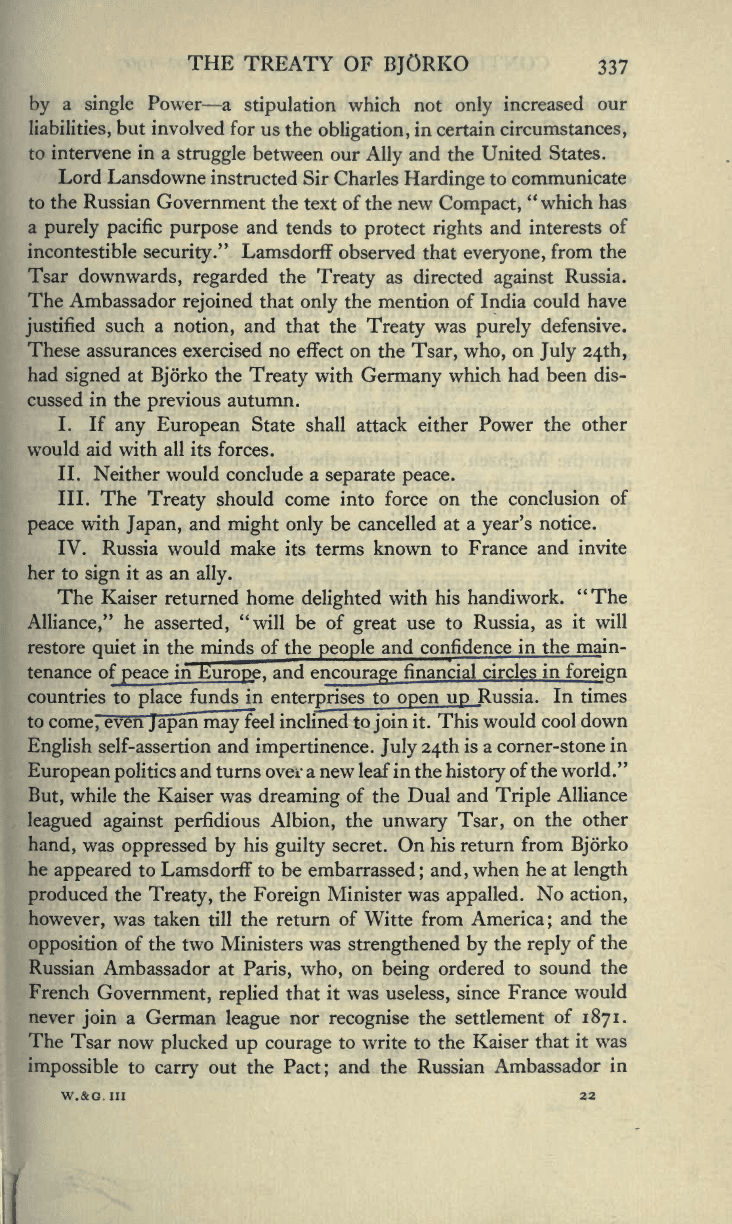
THE
TREATY
OF
BjORKO
337
by
a
single
Power
—
a
stipulation
which not
only
increased
our
liabilities,
but
involved
for
us
the
obligation,
in
certain
circumstances,
to
intervene
in
a
struggle
between our
Ally
and
the
United
States.
Lord
Lansdowne
instructed Sir
Charles
Hardinge
to communicate
to
the
Russian
Government the
text
of
the
new
Compact,
"which
has
a
purely pacific purpose
and
tends
to
protect
rights
and interests
of
incontestible
security.
"
Lamsdorff
observed
that
everyone,
from the
Tsar
downwards,
regarded
the
Treaty
as directed
against
Russia.
The Ambassador
rejoined
that
only
the
mention
of India could
have
justified
such a
notion,
and
that the
Treaty
was
purely
defensive.
These assurances
exercised no
effect
on
the
Tsar, who,
on
July 24th,
had
signed
at
Bjorko
the
Treaty
with
Germany
which
had been dis-
cussed in
the
previous
autumn.
I. If
any European
State
shall
attack either
Power the
other
would aid
with
all
its
forces.
II.
Neither would conclude a
separate peace.
III.
The
Treaty
should come
into
force
on
the
conclusion
of
peace
with
Japan,
and
might only
be cancelled
at
a
year's
notice.
IV. Russia
would make
its terms
known
to
France
and invite
her to
sign
it as an
ally.
The Kaiser
returned
home
delighted
with
his
handiwork.
"The
Alliance,"
he
asserted,
"will be
of
great
use to
Russia,
as it
will
restore
quiet
in
the minds
of
the
people
and confidence
in
the
ma
in-
tenance o
f
peace
in
Europe,
and e
ncourage
financial circles
in forei
gn
countries to
place
f
unds in
ente
rprises
to
open
up
R
ussia.
In
times
to
come,
even
Japan
may
feel
inclined
to
join
it.
This would cool
down
English
self-assertion
and
impertinence.
July 24th
is a corner-stone
in
European
politics
and
turns over
a
new leaf
in
the
history
of
the
world."
But,
while the Kaiser was
dreaming
of
the
Dual
and
Triple
Alliance
leagued
against perfidious
Albion,
the
unwary
Tsar,
on
the
other
hand,
was
oppressed
by
his
guilty
secret. On
his
return
from
Bjorko
he
appeared
to Lamsdorff
to
be
embarrassed;
and,
when he at
length
produced
the
Treaty,
the
Foreign
Minister was
appalled.
No
action,
however,
was
taken till the return
of
Witte
from
America;
and the
opposition
of
the
two Ministers
was
strengthened by
the
reply
of the
Russian
Ambassador
at
Paris,
who,
on
being
ordered to
sound
the
French
Government,
replied
that it
was
useless,
since
France
would
never
join
a
German
league
nor
recognise
the settlement
of
1871.
The
Tsar now
plucked up
courage
to write
to the
Kaiser
that
it
was
impossible
to
carry
out
the
Pact;
and the
Russian
Ambassador
in
w.&g.iii
22
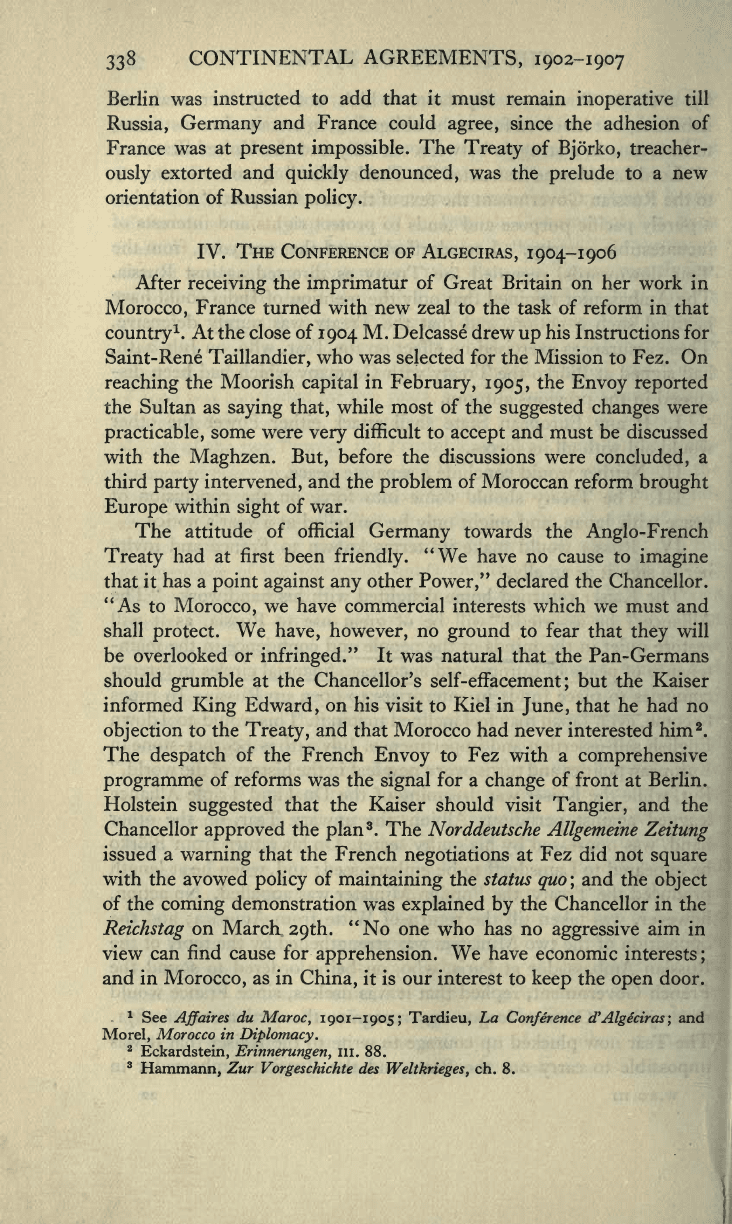
338
CONTINENTAL
AGREEMENTS,
1902-1907
Berlin was
instructed
to
add
that
it must remain
inoperative
till
Russia,
Germany
and France
could
agree,
since
the
adhesion
of
France
was at
present impossible.
The
Treaty
of
Bjorko,
treacher-
ously
extorted
and
quickly
denounced,
was
the
prelude
to
a new
orientation
of
Russian
policy.
IV.
The Conference
of
Algeciras,
1
904-1 906
After
receiving
the
imprimatur
of
Great Britain
on her work in
Morocco,
France
turned
with new zeal
to the task
of
reform
in
that
country
1
.
At the
close
of
1904
M. Delcasse
drew
up
his
Instructions
for
Saint-Rene
Taillandier,
who was
selected
for
the
Mission
to
Fez.
On
reaching
the
Moorish
capital
in
February,
1905,
the
Envoy
reported
the
Sultan
as
saying
that,
while
most
of
the
suggested changes
were
practicable,
some
were
very
difficult
to
accept
and
must
be
discussed
with
the
Maghzen.
But,
before
the
discussions
were
concluded,
a
third
party
intervened,
and
the
problem
of
Moroccan reform
brought
Europe
within
sight
of
war.
The
attitude
of
official
Germany
towards
the
Anglo-French
Treaty
had
at first
been
friendly.
"We have no
cause
to
imagine
that
it
has a
point
against any
other
Power,"
declared
the
Chancellor.
"As
to
Morocco,
we
have commercial
interests
which we
must
and
shall
protect.
We
have, however,
no
ground
to fear
that
they
will
be
overlooked
or
inf
ringed.
"
It was natural
that the
Pan-Germans
should
grumble
at the
Chancellor's
self-effacement;
but the Kaiser
informed
King
Edward,
on
his
visit to Kiel
in
June,
that
he had
no
objection
to
the
Treaty,
and
that
Morocco had never
interested
him
2
.
The
despatch
of
the French
Envoy
to
Fez
with
a
comprehensive
programme
of
reforms was
the
signal
for a
change
of
front at
Berlin.
Holstein
suggested
that the Kaiser should
visit
Tangier,
and
the
Chancellor
approved
the
plan
3
.
The Norddeutsche
Allgemeine
Zeitung
issued a
warning
that the French
negotiations
at
Fez did
not
square
with the
avowed
policy
of
maintaining
the
status
quo
;
and
the
object
of
the
coming
demonstration was
explained by
the
Chancellor
in
the
Reichstag
on
March
29th.
"No one
who
has no
aggressive
aim in
view can
find
cause
for
apprehension.
We have
economic
interests;
and
in
Morocco,
as
in
China,
it
is
our
interest to
keep
the
open
door.
1
See
Affaires
du
Maroc,
1901-1905;
Tardieu,
La
Conference d'Algiciras\
and
Morel,
Morocco in
Diplomacy.
2
Eckardstein, Erinnerungen,
ill.
88.
3
Hammann,
Zur
Vorgeschichte
des
Weltkrieges,
ch. 8.
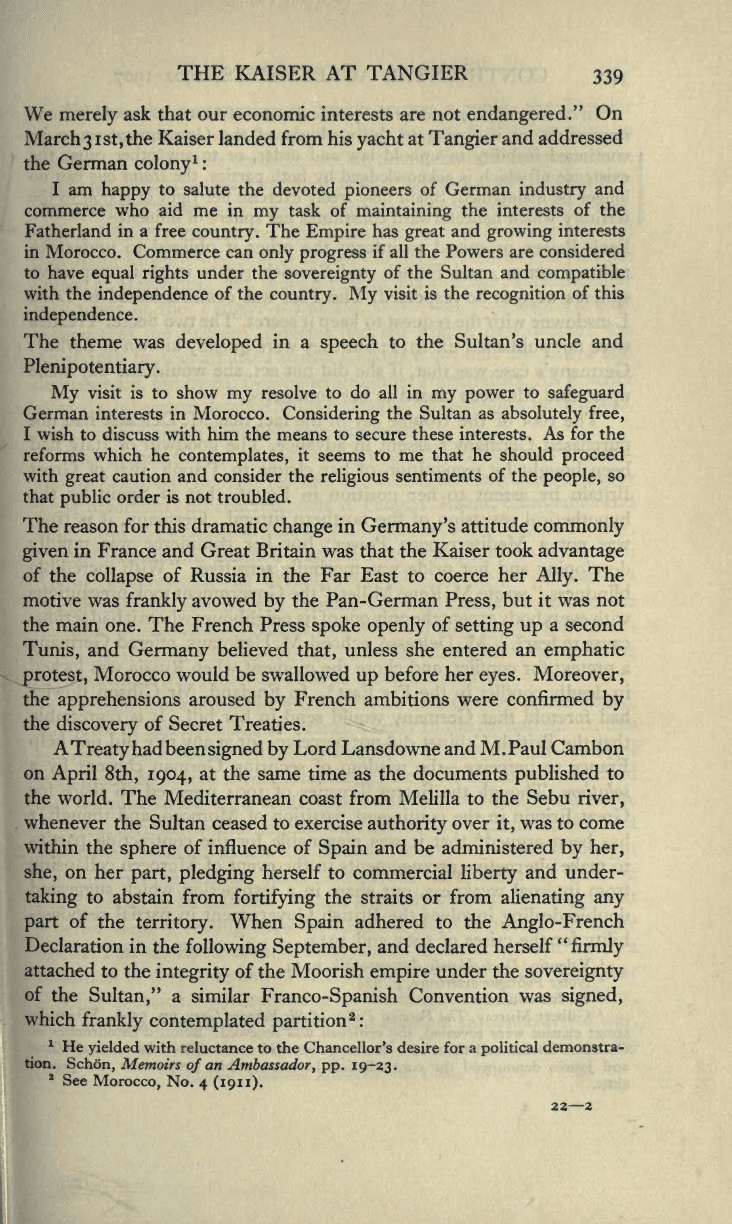
THE
KAISER AT
TANGIER
339
We
merely
ask that our economic
interests
are
not
endangered."
On
March
3
1
st,
the
Kaiser
landed from his
yacht
at
Tangier
and addressed
the
German
colony
1
:
I am
happy
to
salute
the
devoted
pioneers
of
German
industry
and
commerce
who aid
me in
my
task of
maintaining
the
interests
of
the
Fatherland
in a
free
country.
The
Empire
has
great
and
growing
interests
in Morocco. Commerce can
only progress
if
all the Powers are
considered
to
have
equal rights
under
the
sovereignty
of the Sultan
and
compatible
with
the
independence
of
the
country. My
visit
is the
recognition
of this
independence.
The
theme was
developed
in
a
speech
to
the Sultan's
uncle and
Plenipotentiary.
My
visit
is to
show
my
resolve
to
do all in
my
power
to
safeguard
German interests
in
Morocco.
Considering
the Sultan as
absolutely
free,
I
wish to discuss with him
the means
to
secure
these interests. As
for the
reforms
which he
contemplates,
it
seems
to me
that
he
should
proceed
with
great
caution and consider the
religious
sentiments
of
the
people,
so
that
public
order is not troubled.
The reason
for
this
dramatic
change
in
Germany's
attitude
commonly
given
in France and
Great
Britain was that the
Kaiser
took
advantage
of
the
collapse
of
Russia
in
the
Far
East
to coerce
her
Ally.
The
motive was
frankly
avowed
by
the
Pan-German
Press,
but
it
was not
the main
one. The
French
Press
spoke
openly
of
setting
up
a
second
Tunis,
and
Germany
believed
that,
unless
she
entered
an
emphatic
protest,
Morocco would be swallowed
up
before
her
eyes.
Moreover,
the
apprehensions
aroused
by
French
ambitions
were
confirmed
by
the
discovery
of
Secret
Treaties.
A
Treaty
had
been
signed by
Lord
Lansdowne
and M.Paul
Cambon
on
April
8th,
1904,
at the same time as
the
documents
published
to
the
world. The
Mediterranean
coast
from
Melilla to the
Sebu
river,
whenever
the Sultan
ceased
to
exercise
authority
over
it,
was
to
come
within
the
sphere
of
influence
of
Spain
and
be administered
by
her,
she,
on
her
part,
pledging
herself to commercial
liberty
and under-
taking
to
abstain
from
fortifying
the
straits
or from
alienating any
part
of
the
territory.
When
Spain
adhered
to the
Anglo-French
Declaration in
the
following
September,
and declared
herself
"firmly
attached
to the
integrity
of
the
Moorish
empire
under
the
sovereignty
of
the
Sultan,"
a similar
Franco-
Spanish
Convention
was
signed,
which
frankly contemplated
partition
2
:
t
l
He
yielded
with
reluctance to the Chancellor's desire
for a
political
demonstra-
1.
Schon,
Memoirs
of
an
Ambassador,
pp. 19-23.
2
See
Morocco,
No.
4
(191
1).
22—2
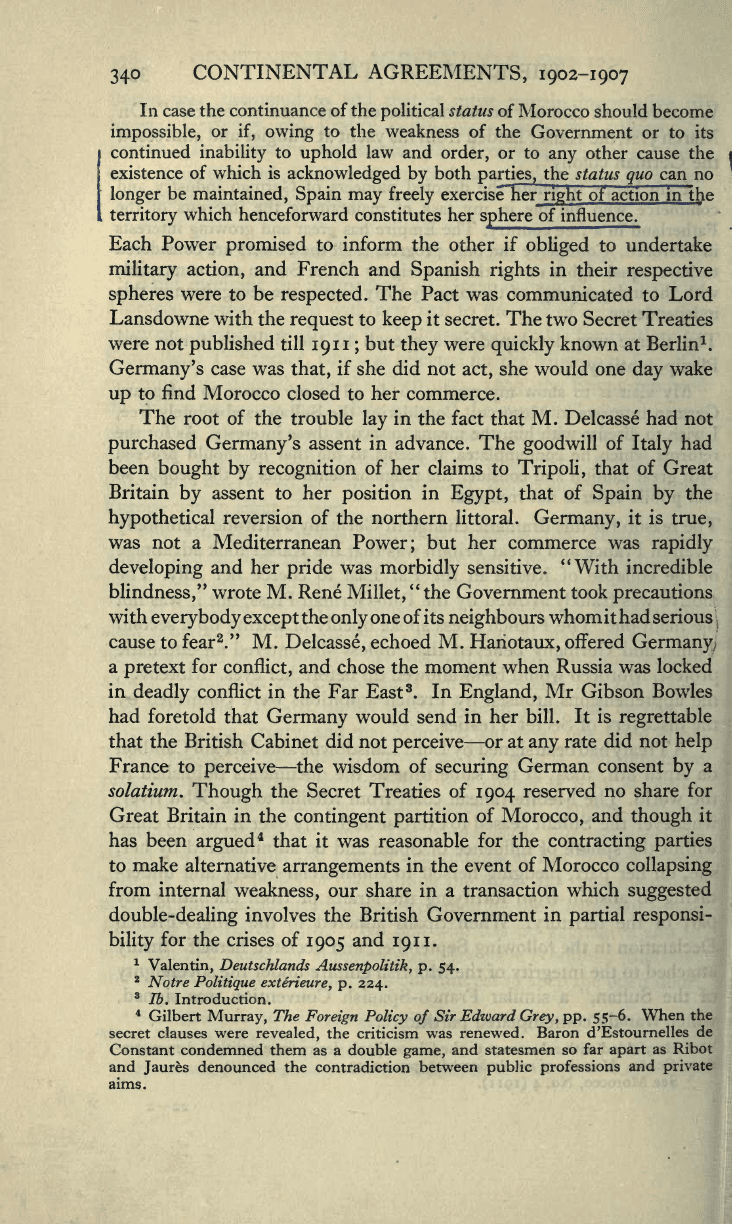
340
CONTINENTAL
AGREEMENTS,
1902-1907
In case
the continuance of
the
political
status
of Morocco should
become
impossible,
or
if,
owing
to
the
weakness of
the
Government
or to
its
continued
inability
to
uphold
law
and
order,
or to
any
other cause the
existence
of
which is
acknowledged
by
both
parties,
the status
quo
can
no
longer
be
maintained,
Spain may
freely
exercise"her
right
of action in the
territory
which
henceforward
constitutes her
sphere
of
influence.
Each Power
promised
to inform
the
other
if
obliged
to
undertake
military
action,
and French and
Spanish
rights
in
their
respective
spheres
were
to
be
respected.
The
Pact
was
communicated to
Lord
Lansdowne
with the
request
to
keep
it
secret.
The
two
Secret
Treaties
were
not
published
till
191
1
;
but
they
were
quickly
known
at
Berlin
1
.
Germany's
case was
that,
if
she
did
not
act,
she
would one
day
wake
up
to
find
Morocco closed
to
her
commerce.
The
root
of
the trouble
lay
in
the
fact
that
M.
Delcasse had
not
purchased
Germany's
assent
in
advance. The
goodwill
of
Italy
had
been
bought by
recognition
of her
claims
to
Tripoli,
that
of
Great
Britain
by
assent to her
position
in
Egypt,
that
of
Spain
by
the
hypothetical
reversion
of
the northern littoral.
Germany,
it
is
true,
was
not a
Mediterranean
Power;
but
her commerce was
rapidly
developing
and her
pride
was
morbidly
sensitive. ''With
incredible
blindness,"
wrote M. Rene
Millet,
"the
Government took
precautions
with
everybody
except
the
only
one of
its
neighbours
whom
it
had
serious
1
cause to
fear
2
." M.
Delcasse,
echoed
M.
Hanotaux,
offered
Germany,
a
pretext
for
conflict,
and chose
the moment
when
Russia was locked
in
deadly
conflict
in
the
Far
East
3
. In
England,
Mr Gibson
Bow
r
les
had
foretold
that
Germany
would send
in
her
bill. It is
regrettable
that the
British Cabinet
did
not
perceive
—
or at
any
rate
did
not
help
France
to
perceive
—
the wisdom
of
securing
German consent
by
a
solatium.
Though
the
Secret Treaties
of
1904
reserved
no
share
for
Great
Britain
in
the
contingent
partition
of
Morocco,
and
though
it
has been
argued
4
that it
was
reasonable
for
the
contracting
parties
to make
alternative
arrangements
in
the
event
of Morocco
collapsing
from
internal
weakness,
our share
in a
transaction
which
suggested
double-dealing
involves
the British
Government
in
partial
responsi-
bility
for
the crises of
1905
and
191
1.
1
Valentin,
Deutschlands
Aussenpolitik, p.
54.
2
Notre
Politique
exterieure,
p.
224.
3
lb. Introduction.
4
Gilbert
Murray,
The
Foreign Policy of
Sir
Edward
Grey, pp.
55-6.
When
the
secret clauses were
revealed,
the criticism
was renewed.
Baron d'Estournelles
de
Constant condemned them as a
double
game,
and statesmen
so
far
apart
as
Ribot
and
Jaures
denounced the contradiction
between
public
professions
and
private
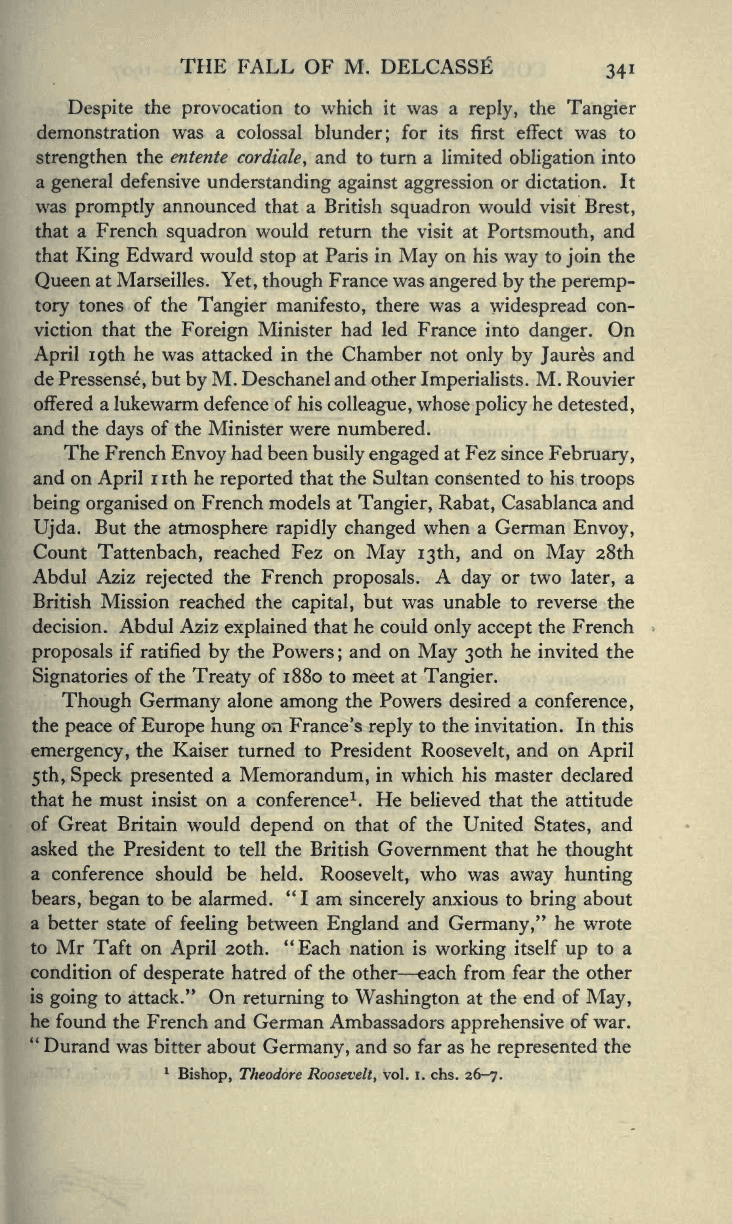
THE FALL
OF
M.
DELCASSfi
341
Despite
the
provocation
to which it was a
reply,
the
Tangier
demonstration
was a
colossal
blunder;
for
its first effect
was
to
strengthen
the
entente
cordiale,
and
to turn
a
limited
obligation
into
a
general
defensive
understanding against
aggression
or
dictation. It
was
promptly
announced
that
a
British
squadron
would
visit
Brest,
that
a French
squadron
would
return the
visit at
Portsmouth,
and
that
King
Edward would
stop
at Paris
in
May
on
his
way
to
join
the
Queen
at Marseilles.
Yet,
though
France
was
angered
by
the
peremp-
tory
tones
of
the
Tangier
manifesto,
there
was a
widespread
con-
viction that
the
Foreign
Minister
had
led
France
into
danger.
On
April
19th
he was
attacked
in
the
Chamber
not
only by
Jaures
and
de
Pressense,
but
by
M.
Deschanel and other
Imperialists.
M.
Rouvier
offered
a lukewarm
defence
of his
colleague,
whose
policy
he
detested,
and
the
days
of
the
Minister
were numbered.
The French
Envoy
had been
busily engaged
at Fez since
February,
and
on
April
nth he
reported
that
the Sultan consented to
his
troops
being organised
on
French models at
Tangier,
Rabat,
Casablanca and
Ujda.
But the
atmosphere
rapidly changed
when a German
Envoy,
Count
Tattenbach,
reached
Fez
on
May 13th,
and on
May
28th
Abdul
Aziz
rejected
the
French
proposals.
A
day
or
two
later,
a
British Mission reached
the
capital,
but
was unable
to reverse
the
decision. Abdul
Aziz
explained
that
he could
only
accept
the French
proposals
if
ratified
by
the Powers
;
and on
May 30th
he
invited the
Signatories
of
the
Treaty
of
1880
to meet at
Tangier.
Though Germany
alone
among
the
Powers
desired
a
conference,
the
peace
of
Europe
hung
on France's
reply
to the invitation.
In
this
emergency,
the
Kaiser
turned to President
Roosevelt,
and on
April
5th,
Speck
presented
a
Memorandum,
in which his
master declared
that he must
insist
on a conference
1
. He believed
that the attitude
of
Great
Britain
would
depend
on
that
of
the United
States,
and
asked
the President to tell the
British
Government that
he
thought
a
conference should be
held.
Roosevelt,
who was
away hunting
bears,
began
to be alarmed.
"
I
am
sincerely
anxious
to
bring
about
a
better
state
of
feeling
between
England
and
Germany/
'
he
wrote
to Mr
Taft
on
April
20th.
"Each
nation is
working
itself
up
to
a
condition
of
desperate
hatred
of
the other
—
each
from fear the other
is
going
to
attack."
On
returning
to
Washington
at
the
end
of
May,
he
found
the French and
German Ambassadors
apprehensive
of
war.
"
Durand
was
bitter
about
Germany,
and so far as he
represented
the
1
Bishop,
Theodore Roosevelt
,
vol.
i.
chs.
26-7.
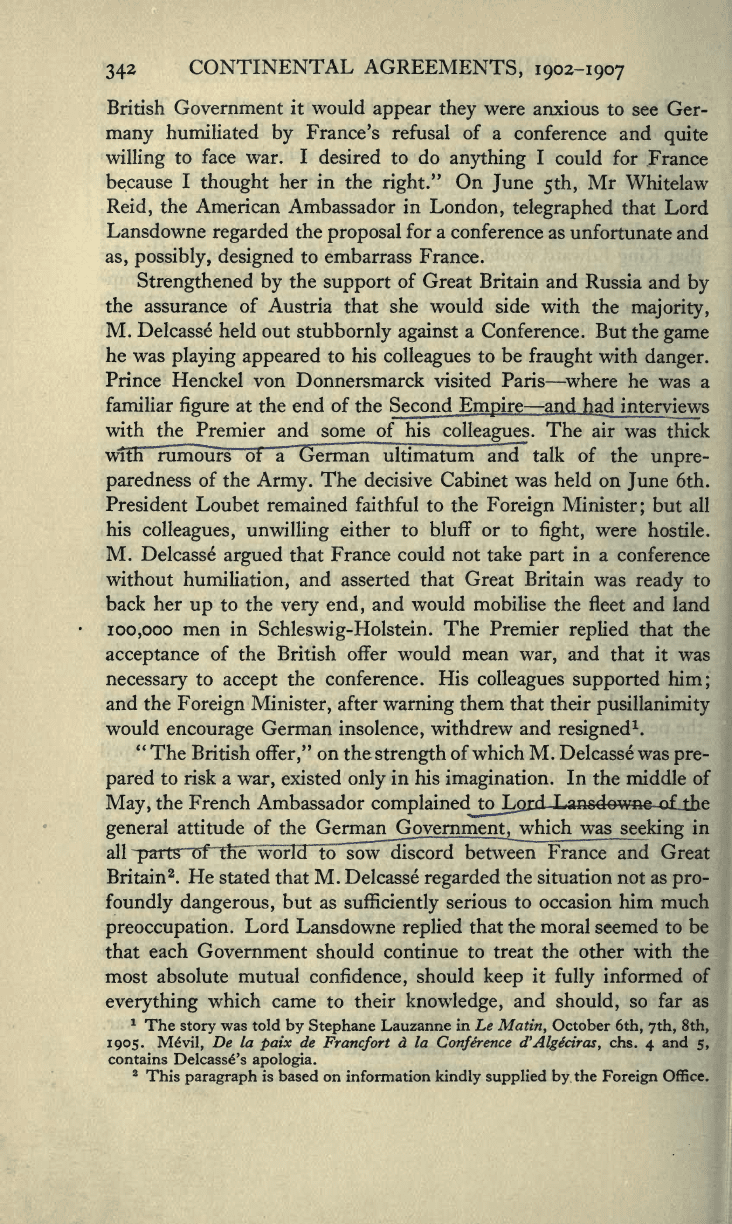
342
CONTINENTAL
AGREEMENTS,
1902-1907
British
Government
it
would
appear
they
were
anxious
to
see Ger-
many
humiliated
by
France's refusal of
a
conference
and
quite
willing
to
face
war.
I
desired
to
do
anything
I
could
for
France
because
I
thought
her in
the
right."
On
June
5th,
Mr
Whitelaw
Reid,
the American
Ambassador
in
London,
telegraphed
that
Lord
Lansdowne
regarded
the
proposal
for a
conference as
unfortunate
and
as,
possibly,
designed
to
embarrass
France.
Strengthened
by
the
support
of
Great Britain and
Russia and
by
the assurance of
Austria that
she would
side
with
the
majority,
M. Delcasse held
out
stubbornly
against
a Conference.
But the
game
he
was
playing appeared
to
his
colleagues
to
be
fraught
with
danger.
Prince
Henckel von
Donnersmarck
visited
Paris
—
where
he
was a
familiar
figure
at the
end of
the
Second
Empire
—
and had
interviews
with
the Premier
an
d
some
of his
colleagues.
The air
was thick
with
rumours ot
a ^German
ultimatum
and
talk
of
the
unpre-
paredness
of
the
Army.
The decisive
Cabinet
was held on
June
6th.
President
Loubet
remained faithful
to
the
Foreign
Minister;
but
all
his
colleagues,
unwilling
either to
bluff or
to
fight,
were
hostile.
M.
Delcasse
argued
that
France could not take
part
in a
conference
without
humiliation,
and
asserted that
Great
Britain was
ready
to
back her
up
to the
very
end,
and
would mobilise
the fleet and land
100,000
men in
Schleswig-Holstein.
The
Premier
replied
that
the
acceptance
of
the British
offer would mean
war,
and
that it
was
necessary
to
accept
the conference.
His
colleagues supported
him;
and the
Foreign
Minister,
after
warning
them
that their
pusillanimity
would
encourage
German
insolence,
withdrew
and
resigned
1
.
"
The
British
offer,"
on
the
strength
of which M. Delcasse
was
pre-
pared
to
risk a
war,
existed
only
in his
imagination.
In
the
middle
of
May,
the French Ambassador
complaine
d
to
jL
ord
Lansdowne
-of_tbe
general
attitude
of
the German
Government
,
which was se
eking
in
all
^paits~Ttf
_
tne"'world
to "sow
discord between France and
Great
Britain
2
. He
stated
that
M. Delcasse
regarded
the situation
not
as
pro-
foundly dangerous,
but as
sufficiently
serious to occasion
him
much
preoccupation.
Lord
Lansdowne
replied
that the moral seemed
to
be
that
each
Government should continue
to
treat the other
with
the
most absolute
mutual
confidence,
should
keep
it
fully
informed
of
everything
which
came
to
their
knowledge,
and
should,
so
far as
1
The
story
was told
by
Stephane
Lauzanne
in he
Matin,
October
6th, 7th,
8th,
1905. MeVil,
De la
paix
de
Francfort
a la
Conference
d'Algdctras,
chs.
4
and
5,
contains
Delcass£'s
apologia.
2
This
paragraph
is
based on information
kindly supplied by
the
Foreign
Office.
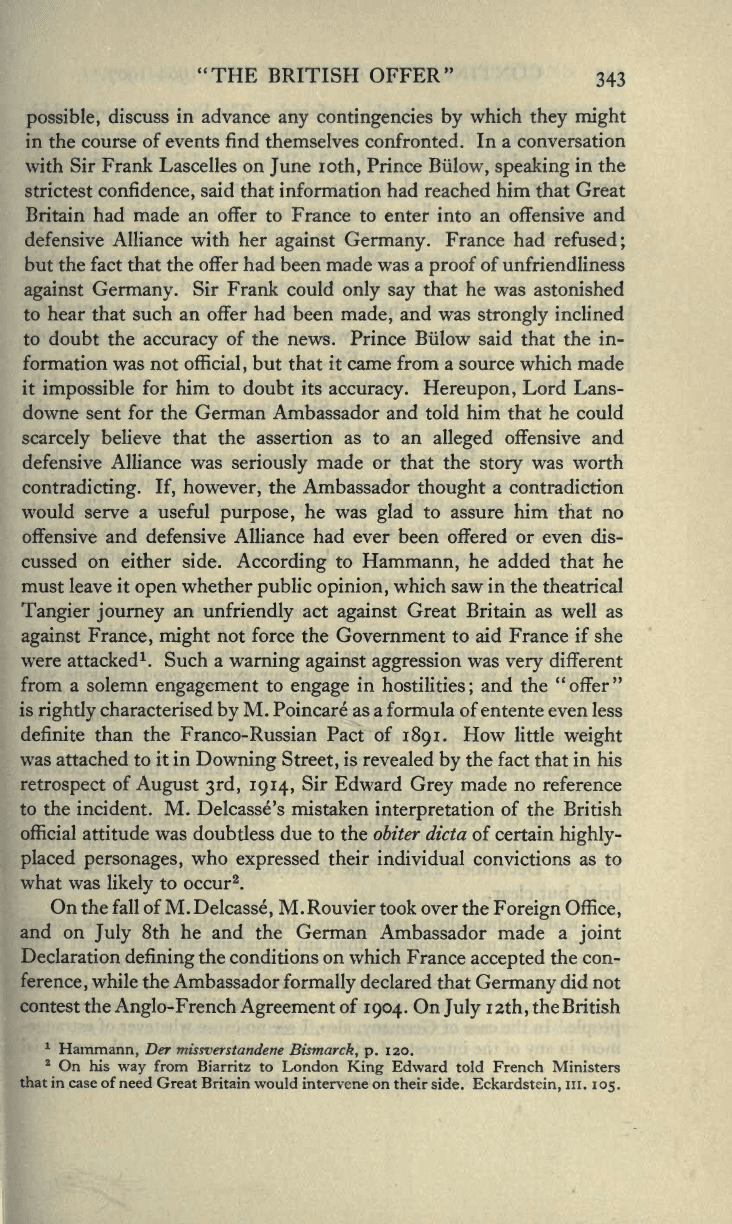
"THE BRITISH OFFER"
343
possible,
discuss
in
advance
any contingencies by
which
they
might
in
the course
of
events
find
themselves
confronted.
In
a
conversation
with
Sir Frank Lascelles on
June
10th,
Prince
Biilow,
speaking
in
the
strictest
confidence,
said
that information
had reached him
that
Great
Britain
had made an
offer to France
to enter into
an offensive
and
defensive Alliance with
her
against Germany.
France
had
refused;
but the fact that the
offer had been
made
was a
proof
of
unfriendliness
against
Germany.
Sir Frank could
only
say
that
he was
astonished
to
hear
that
such
an
offer
had
been
made,
and was
strongly
inclined
to
doubt
the
accuracy
of the news. Prince Biilow said
that the
in-
formation was not
official,
but
that it
came
from a
source which made
it
impossible
for him
to doubt its
accuracy.
Hereupon,
Lord
Lans-
downe
sent
for
the German
Ambassador and
told
him
that
he
could
scarcely
believe
that
the assertion
as
to
an
alleged
offensive and
defensive Alliance was
seriously
made or
that the
story
was
worth
contradicting.
If,
however,
the
Ambassador
thought
a
contradiction
would
serve
a useful
purpose,
he was
glad
to assure
him
that
no
offensive
and defensive Alliance had ever been
offered
or
even dis-
cussed
on
either
side.
According
to
Hammann,
he
added
that
he
must leave it
open
whether
public
opinion,
which saw
in
the theatrical
Tangier journey
an
unfriendly
act
against
Great
Britain
as well as
against
France,
might
not
force
the
Government to
aid France
if
she
were
attacked
1
. Such a
warning against
aggression
was
very
different
from
a solemn
engagement
to
engage
in
hostilities;
and the "offer"
is
rightly
characterised
by
M.
Poincare
as
a formula of
entente
even less
definite than the Franco-
Russian
Pact
of
1891.
How
little
weight
was attached
to
it in
Downing
Street,
is revealed
by
the
fact
that
in his
retrospect
of
August 3rd,
19 14,
Sir
Edward
Grey
made
no
reference
to the
incident.
M.
Delcasse's mistaken
interpretation
of
the British
official
attitude
was
doubtless
due
to
the
obiter
dicta of
certain
highly-
placed
personages,
who
expressed
their individual
convictions
as
to
what
was
likely
to occur
2
.
On
the
fall of M.
Delcasse,
M. Rouvier
took
over the
Foreign
Office,
and
on
July
8th
he and
the
German
Ambassador made
a
joint
Declaration
defining
the
conditions
on
which
France
accepted
the
con-
ference,
while
the Ambassador
formally
declared
that
Germany
did
not
contest the
Anglo-French
Agreement
of
1904.
On
July
12th,
the British
1
Hammann,
Der
missverstandene
Bismarck,
p.
120.
2
On
his
way
from
Biarritz to London
King
Edward
told
French
Ministers
that in
case of
need
Great Britain
would
intervene on
their
side.
Eckardstein,
in.
105.
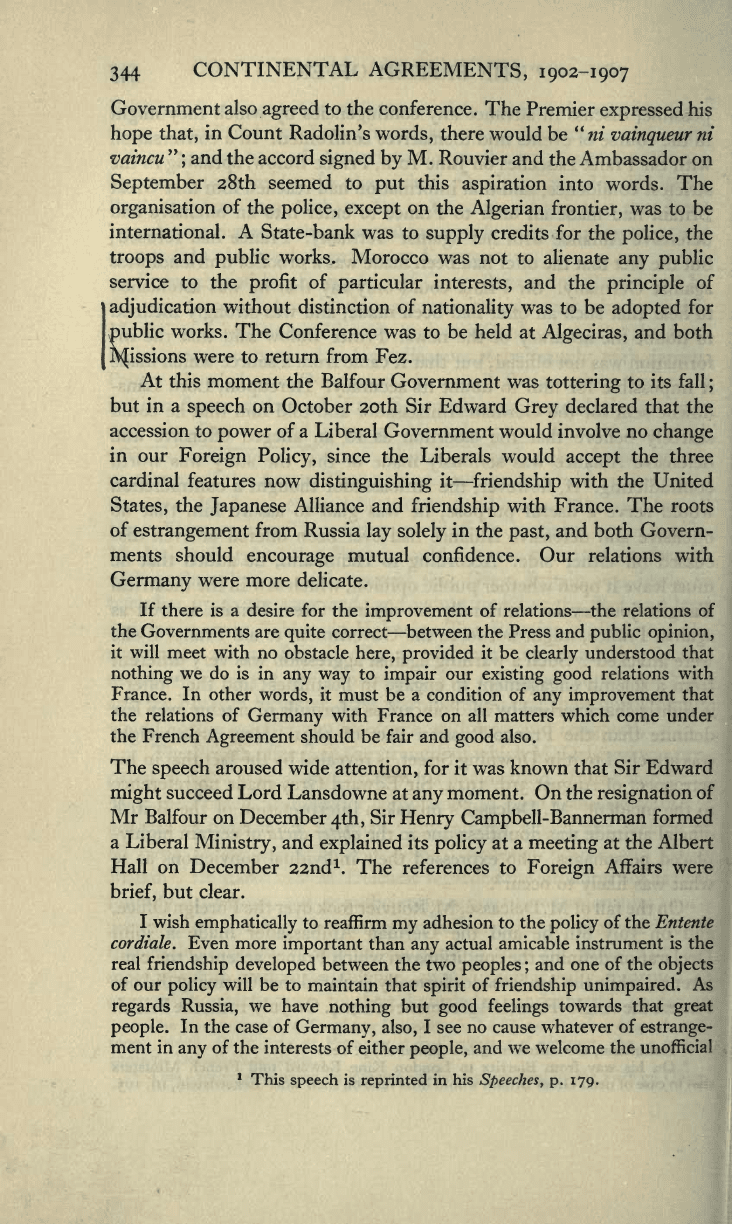
344
CONTINENTAL
AGREEMENTS,
1902-1907
Government
also
agreed
to the
conference.
The
Premier
expressed
his
hope
that,
in
Count
Radolin's
words,
there
would
be "ni
vainqueur
ni
vaincu
"
;
and
the accord
signed by
M.
Rouvier
and
the Ambassador on
September
28th seemed
to
put
this
aspiration
into
words. The
organisation
of
the
police,
except
on
the
Algerian
frontier,
was
to
be
international. A
State-bank was
to
supply
credits
for
the
police,
the
troops
and
public
works.
Morocco was
not to
alienate
any
public
service
to
the
profit
of
particular
interests,
and
the
principle
of
adjudication
without distinction
of
nationality
was
to be
adopted
for
public
works.
The
Conference was
to
be held
at
Algeciras,
and
both
fissions
were
to return
from
Fez.
At this
moment the Balfour
Government
was
tottering
to
its
fall
;
but
in a
speech
on
October
20th
Sir Edward
Grey
declared
that
the
accession
to
power
of a
Liberal
Government
would involve no
change
in our
Foreign
Policy,
since
the Liberals
would
accept
the three
cardinal
features
now
distinguishing
it
—
friendship
with the
United
States,
the
Japanese
Alliance
and
friendship
with
France. The
roots
of
estrangement
from Russia
lay solely
in
the
past,
and
both
Govern-
ments
should
encourage
mutual
confidence.
Our
relations
with
Germany
were more
delicate.
If
there is a
desire
for
the
improvement
of
relations
—
the relations
of
the Governments
are
quite
correct
—
between the Press and
public opinion,
it will
meet with no
obstacle
here,
provided
it be
clearly
understood
that
nothing
we
do
is in
any way
to
impair
our
existing good
relations with
France. In
other
words,
it must be a condition of
any
improvement
that
the
relations
of
Germany
with France on
all
matters which come
under
the French
Agreement
should be
fair
and
good
also.
The
speech
aroused
wide
attention,
for
it
was known
that
Sir
Edward
might
succeed Lord
Lansdowne
at
any
moment.
On
the
resignation
of
Mr
Balfour on
December
4th,
Sir
Henry
Campbell-Bannerman
formed
a
Liberal
Ministry,
and
explained
its
policy
at a
meeting
at the
Albert
Hall on
December
22nd
1
.
The references
to
Foreign
Affairs were
brief,
but clear.
I
wish
emphatically
to reaffirm
my
adhesion
to
the
policy
of
the
Entente
cordiale. Even
more
important
than
any
actual
amicable instrument
is the
real
friendship
developed
between the
two
peoples
;
and one of
the
objects
of our
policy
will
be
to
maintain
that
spirit
of
friendship unimpaired.
As
regards
Russia,
we
have
nothing
but
good
feelings
towards
that
great
people.
In
the case of
Germany,
also,
I see
no
cause whatever
of
estrange-
ment in
any
of
the
interests
of
either
people,
and we welcome
the unofficial
1
This
speech
is
reprinted
in his
Speeches, p.
179.
